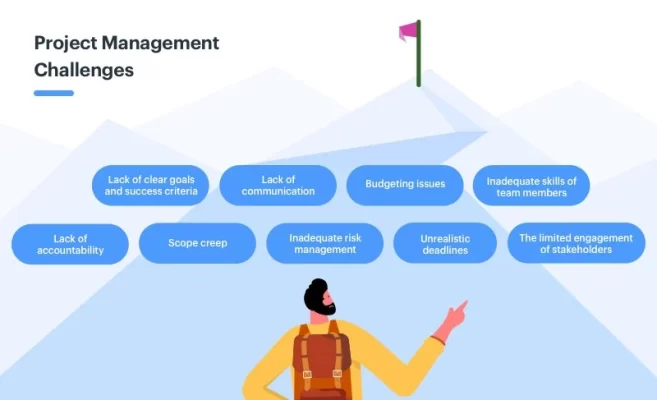Whether your experience level is high or you are someone just beginning your path in project management, you will agree that managing projects is not easy.
Time Project Scale Budget
Companies are losing millions of dollars annually and finding it difficult to address the project management problems and challenges they encounter even with the several resources, project management tools, training materials, and flexible approaches at hand.
According to a Harvard Business Review analysis, approximately 70% of IT projects have project delays and one in every six projects spends more than 200% of the projected total. Project managers are supposed to stop that, but they also have many difficulties in trying to do so.
Together with guidance on how to handle these nine most often occurring problems project managers encounter, we have compiled a list.
1. Scope Creep in General
Any project will naturally and expectedly experience scope creep. Though occasionally it can be helpful, often the negatives exceed the benefits. Project teams 52% said experienced scope creep in 2017; the tendency is still rising. One of the toughest project management issues facing managers and the project team is clients that lack exact knowledge of their needs and have nebulous specifications.
Dealing with it: By proactive client engagement throughout the project planning stage, you can not only grasp their expectations but also find their exact needs. Crucially also is precisely planning your use of resources and talent. Furthermore, it is crucial to avoid accepting ad hoc change requests during project implementation since this could cause delays and extra expenses. Stay to the original idea.
2. Inadequate Correspondence
A good project depends much on effective communication in project management. To guarantee that every interested party is part of the process, you must have open and timely means of contact. According to Deloitte, the main concern of project management among professionals is communication, at thirty-two percent.
For project teams, miscommunication poses another threat since it influences their cooperation. It could lead to team member disputes and maybe postpone the project.
How to handle it: Project managers may rely on several collaboration and project management tools accessible in the market to guarantee that everyone keeps current. Project collaboration tools provide more transparency in projects and team responsibility in addition to helping managers to do their jobs. Features like contextual comments, @mentions, and priority assignment abilities help to do this.
Furthermore, few times weekly regular short stand-up meetings might help to greatly avoid misinterpretation.
3. Insufficient Well-Defined Objectives and Success Criteria
One of the most crucial prerequisites for the effective completion of the project is clarity; lack of it generates a number of project management problems. According to research, the lack of a well-defined project aim and a project plan causes over 39% of projects to fail.
How to handle it: Setting up project milestones and quality testing helps a project manager also come up with a method of measuring project development. Apart from enabling your team to develop, a well-defined set of goals will assist project managers in defending their vision in front of the higher management and the clients.
Popular methods for goal development such as SMART and CLEAR can enable a project manager to create a set of reasonable objectives straight from the beginning of a project. This can assist to remove project management’s obstacles. Furthermore, one should remember that not precisely identifying goals is a mistake. Thus, after you establish objectives for your project team, let colleagues clearly see them. Verify them.
4. Problem with Budgets
Most managers agree that one of the main obstacles in good project management is financial ones. In 2017, 49.5% of manufacturing managers said that their main project management difficulty is cost control. Effective cost control helps a manager to avoid some typical problems a project may encounter and aim for faster and better results.
How to handle it: To prevent cost overruns, one must definitely use a suitable project scheduling tool, budgeting technique, and make reasonable assumptions. Project scope planning calls for consideration of the budget at hand. Otherwise, restrictions on budgets could compromise the very viability of a poorly funded enterprise. Like in other aspects of project management, documentation is absolutely essential.
5. Insufficient Team Member Skill Set
In the case of project teams, performance mostly depends on the individual skill level of the members; a chain is as strong as its weakest link. Although you can design the perfect setting for your project, a project manager is likely to fail if the team lacks the required knowledge to address current issues. Only with correct experience and insight will this major project management issue be resolved.
How to handle it: Good project managers pre-determine the required project management skills and competencies and evaluate the current workforce to see whether further staff and skill sets are needed or not.
An efficient project starting strategy will handle project needs as well as the tools needed to meet them. Among these resources include the component of human skill. The basis of the initiation document will be strengthened in the project plan.
6. Ineffective Control of Risk
An essential component of project management is foresight to spot possible “what if” situations and create backup plans. Projects seldom go exactly as expected since so many factors can generate infinite opportunities.
How to handle it: Every project manager’s responsibility is to create backup plans the team might follow should the project start to spiral out of hand. Having a project risk management system aids in the identification and reduction of the several kinds of hazards. One should always have a backup strategy in place. This strategy should list every risk that, should they develop, the course of action to be followed.
7. Insufficient Responsibility
When every member of a project team feels accountable and strives to carry out their designated roles, the team performs really brilliantly. Absence of responsibility among team members might destroy a whole project.
How to handle it: Good project managers allocate tasks to team members and guide the group toward the shared objective of effectively finishing their project. Fostering responsibility depends mostly on a project tool that lets one assign and monitor obligations. Furthermore encouraging responsibility is frequent team check-ins.
8. The Little Participation of Interested Parties
Project managers should make sure that every project participant shares their vision of the project and is in agreement with each other. In the last stages of a project, an uninvolved client might create many issues; so, it is crucial to take consumer comments into account and keep them informed all over the process.
How to handle it: Ask your customer and other stakeholders to use your project management platform so they may actively contribute to forming the project and offering comments. Moreover, make sure that right from the beginning of the project planning stage all internal and external stakeholders are updated. Plan frequent meetings including all the stakeholders and appropriately handle their issues.
9. Inaccurate Deadlines
Another project management difficulty that could seriously compromise the quality of the final result is an unattainable timeline. Any competent project manager negotiates the project schedule by giving deadlines first priority and is aware of the capacity of the project team.
How to handle it: In agile project management, velocity—the indicator of work accomplished in a single sprint—is determined jointly by aggregating data from all the stakeholders. This is carried out project-wide during planning. Moreover, the project manager has to routinely check timelines.
This guarantees that any scope creep—that is, any expansion in scope—is either avoided or schedules adjusted as necessary during the project’s running.



